
Dragon's Dogma: Dark Arisen PC Review
In terms of the medieval-inspired Japanese RPGs of the last generation, Dragon's Dogma failed to find an audience where Dark Souls succeeded. Not even an expanded re-release, Dark Arisen, could truly help it at the time despite featuring some solid gold ideas. The years since then have been more kind to Dragon's Dogma, with the title garnering a feverish sort of cult following who preach its virtues at every opportunity. It's one of those 'great games that nobody played,' they'll say, and anybody worth their salt should remedy that.
Generally speaking I'm inclined to agree with that assessment. Dragon's Dogma is a fascinating title, filtering the gameplay and mechanical leanings of Japanese developers through a typically Tolkein-inspired medieval fantasy world. The game is ambitious when it opens with a dragon razing a town and plucking the heart from your hand-created character's chest.
From there it continues to be ambitious for a 2012 game, offering up an open world with minimal guidance for the player. Go forth, explore, wander - do whatever you want. There's subtle takes on systems such as character relationships (here called 'affinity') and even a little pass at an optional romance plot with a character of your choice also built in.
In many ways the game feels ahead of its time, containing ideas that feel distinctly Bethesda-like despite launching a few scant months after Skyrim changed how many Japanese developers considered Western-style RPGs significantly.

It's as if the team at Capcom had noticed the shift in the genre's most popular earlier than the rest of Japan and had a crack at a more Western-style RPG as a result. Also obvious is the influence that Souls must have had, as something of Gransys, Dragon's Dogma's slightly gothic and distinctly European Medieval setting, smacks of that series.
Dragon's Dogma has relatively run-of-the-mill third person action RPG combat, but its true brilliance comes in two key mechanics: the pawn system and clambering.
The former is a clever twist on the use of online connectivity in RPGs. Players construct a party of four; the first is the Arisen, your custom-created hero. The second is always your 'Main Pawn', a character you create with the same in-depth character creation tools as your protagonist. The latter two characters are pawns summoned from 'other worlds' - pawns created by other players. Your pawn also gets uploaded and is out there, and other players can therefore judge everything about him or her from how you've dressed them to what combat job and skills you've entrusted to them.
The clever thing about pawns is that, well, they're clever. They learn as you play. If I've fought a giant troll in my save, my pawn Camilyn (named for Street Fighter's Cammy) might learn of the beast's weak point. When another player chooses to add her to their party, Camilyn takes that knowledge with her, and will reveal her knowledge to that player, exposing new weak points or pointing out what to do next in a quest she's already seen. The benefits go both ways; pawns I bring in can help me, and Camilyn may bring new knowledge back from her adventures when I load a save.
The pawn system is a lovely twist on the party-building mechanics that are core to so many RPGs, encouraging balance in who you take on adventures but also making you care about what you send out into the world. I want Camilyn to be cool and I want her to be used by others, so I care deeply about how I customize her. When I find a great looking character in the rift from another player, I snap them up immediately.
Clambering is a lot simpler to explain - simply put, you can grapple and grab enemies to attack different body parts. Dragon's Dogma is defined by its fights against larger creatures such as griffins, gigantic trolls and of course dragons, and key to this is often climbing up the back or arm of an enemy to do the most damage. Nothing feels quite as awesome as this, and it's honestly an experience I think is fairly unique in the RPG genre. About you, your pawns are assiting, calling out advice - and you clamber up a giant beast, sword readied. It feels special.
Beyond these two tent pole mechanics there's a solid RPG with some good quest design and a job-based character progression system that is merciful in not punishing you for being indecisive or flighty about your job of choice. Better still, it actively encourages switching jobs by having unique skills that can then be transferred to a new role.
There's also some choice-based gameplay hooks, an interesting if perhaps vanilla world, and a story that takes some slightly mad twists and turns in particular via a fascinating 'post-game' section that serves to fully explain just what pawns are in-universe. Dragon's Dogma is a game I sank 50 hours into in a week with ease - and this isn't even the first time I've played it!
Despite all these positive elements, the original release wasn't perfect. Dark Arisen went a long way to fix those issues - it nipped and tucked, tweaking old content and adding new to improve the game, but one thing that Dark Arisen couldn't fix was the power of the formats the game was on. It ran roughly on both Xbox 360 and PlayStation 3, and that performance made the game seem unpolished.
That's the greatest news about this Steam re-release of the title; it throws off those shackles and allows the core of Dragon's Dogma, which is very good indeed, to shine brightly. It's a well-made port with a plethora of graphics options - resolution, frame rate, anti-aliasing, HDR, multiple options for the likes of texture and shadow quality, texture filtering and even some smart options that some games don't provide such as full control of the camera field of view.
Compared to some JRPG ports on Steam, this one comes fully-featured and in my experience after extensive gameplay on two very different rigs (one middle-of-the-road, one top-end) it's also a well optimized port. Even the more modest PC I tested the title on, with an older battle-worn Nvidia 700 series GPU and a practically ancient i5 easily held a solid 60 frames per second at 1080p with most of the settings cranked way up.
My main, more current PC blitzed the game entirely - but the bottom line here is that there's enough options and strong enough optimization for PC architecture that even players on far more modest machines or decent gaming laptops should be able to run Dragon's Dogma better than the original console release - even the easily attainable locked 30 is preferable to the all-over-the-place framerate of the original.
What's gained out of this is simple - Dragon's Dogma's excellent battles, particularly those with larger beasts, are far more enjoyable. The incredible soundtrack blasts as you clamber up the neck of a griffin or some such creature in order to stab it where it hurts the most. The creature thrashes about in an attempt to throw you off, but now rather than choppiness as the camera whips about and spells fly, everything is now silky smooth. You feel like an utter bad ass, and despite the age of the game the excitement of these sections still holds up brilliantly.
I quite liked the console release of Dragon's Dogma, but the performance issues truly obfuscated the brilliance of what's at the heart of this game. I wasn't one of those Dogma cultists before, but the PC release has made me into one. I hold my hands up to them - they're right. It is one of the best games that nobody played, and this PC port is finally the right way to play it. Hopefully it finally finds a broader audience.

